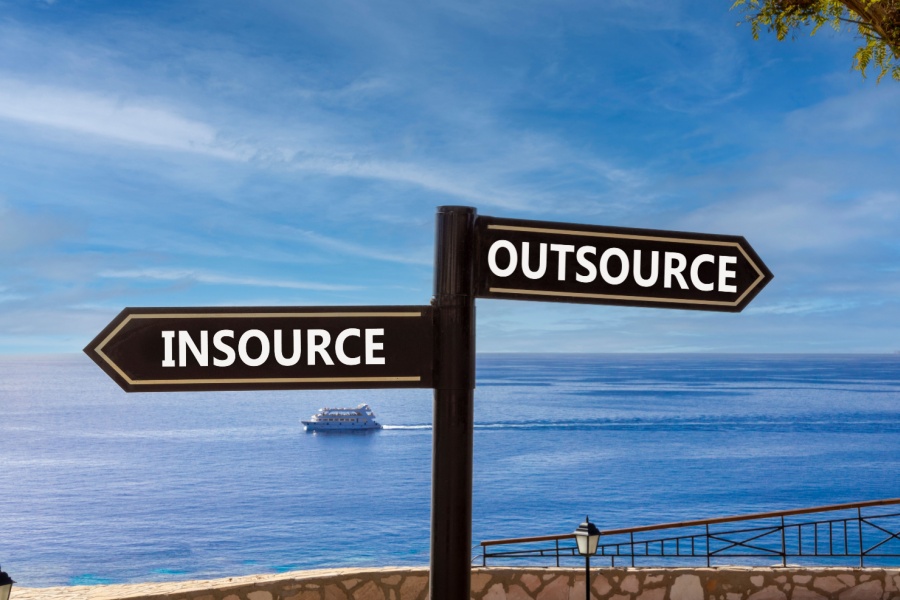Logistics
Warehousing & Fulfillment
Transportation
E-commerce
E-commerce Fulfillment Services
Lease & Maintenance
Semi Trucks
Supply Chain Technology
Logistics
E-commerce
Lease & Maintenance
Buy Used Trucks

Supply chains have become more complex—and more critical—than ever. Between rising transportation costs, persistent driver shortages, capacity constraints, and growing pressure to deliver faster and more sustainably, companies are rethinking how they manage logistics and fleet operations.
At the same time, technology has transformed what’s possible. Advanced data analytics, automation, and real-time visibility tools now give companies unprecedented insight into every mile, shipment, and asset. But keeping up with those innovations—and the costs that come with them—can stretch internal teams thin.
That’s why outsourcing has reemerged as a strategic advantage. For many organizations, partnering with a third-party logistics provider (3PL) isn’t just about outsourcing—it’s about optimizing the entire operation.
Outsourcing isn’t just about cutting costs—it’s about unlocking capability. In the world of supply chain management and commercial fleet management, outsourcing means partnering with a 3PL to handle critical operations like transportation, warehousing, maintenance, or distribution.
Rather than trying to manage every aspect of logistics in-house, companies are increasingly turning to trusted 3PL partners to provide scalable networks, advanced technology, and deep expertise that optimize performance and reduce risk. The right outsourcing strategy allows businesses to focus on their core strengths—innovation, growth, and customer experience—while their logistics partner manages the complexity of the supply chain.
Yet, despite the proven advantages, many organizations remain hesitant to take the leap. Misconceptions about cost, control, and execution still hold some back from realizing the full potential of outsourcing.
Let’s take a closer look at three of the most common myths—and how today’s logistics landscape tells a very different story.
It’s true that no one knows your business better than you do—but the best 3PLs know logistics better than anyone.
Even the most capable organizations can’t be experts in every area. Partnering with a 3PL gives your company access to specialized knowledge, advanced systems, and scale that would be difficult—or expensive—to replicate in-house.
Modern 3PLs leverage powerful data analytics, connected platforms, and predictive maintenance to deliver consistent, measurable results across the supply chain. For instance, Ryder’s technology-driven platforms—like RyderShare™—enable real-time visibility, collaboration, and performance optimization across every mode of transportation.
Instead of stretching internal teams thin trying to manage drivers, maintenance, routing, and compliance, outsourcing allows your organization to concentrate on what truly differentiates your brand. Meanwhile, your logistics partner ensures that freight keeps moving efficiently, safely, and on time.
Today’s reality: Outsourcing isn’t about giving up execution—it’s about elevating it.
This myth dates back to the early days of outsourcing, when visibility was limited and communication channels were narrow. But the modern supply chain looks very different.
With today’s real-time visibility platforms, data dashboards, and performance KPIs, companies have more insight and control than ever before—often more than they had managing operations themselves. A true 3PL partnership is built on transparency and collaboration. It’s not a handoff; it’s an agreement to work together as a single team. The best 3PLs act as an extension of your business, integrating with your systems, sharing metrics, and aligning with your goals.
For example, Ryder’s connected fleet management solutions provide live visibility into fleet performance, maintenance schedules, driver compliance, and delivery status—so decision-makers can see exactly what’s happening across their network at any time.
Today’s reality: The right outsourcing partnership gives you more control, not less—powered by technology, communication, and shared accountability.
In a time when transportation costs, driver wages, and vehicle prices continue to rise, this myth couldn’t be further from the truth.
Outsourcing fleet management and logistics can significantly reduce your total cost of ownership (TCO). By leveraging a 3PL’s scale, expertise, and maintenance infrastructure, companies avoid costly surprises—like unplanned repairs, downtime, or vehicle obsolescence.
Owning and operating a private fleet requires substantial capital investment, not to mention ongoing maintenance, compliance management, and staffing costs. Outsourcing transfers those burdens to a trusted partner who can deliver predictable monthly costs and scalable solutions that flex with your business.
For Ryder customers, that often translates to 20% or more in cost savings, plus the ability to scale up or down based on seasonal or market demand.
Today’s reality: Outsourcing isn’t an expense—it’s a strategic investment that protects cash flow, improves reliability, and enhances flexibility.
If you’re evaluating whether outsourcing your supply chain or fleet management makes sense, here are three steps to guide your decision:
Take a hard look at your logistics network. Are inefficiencies costing you time or money? Is maintenance or driver turnover limiting your growth? A thorough operational review can reveal where a 3PL can create the most value.
Don’t stop at comparing line items. Look at the total cost of ownership—including vehicle downtime, administrative overhead, recruiting, compliance, and technology investment. The hidden costs of managing it all yourself are often higher than you realize.
A 3PL relationship should be a strategic partnership built around transparency, performance, and shared goals. Look for a provider with proven experience, robust technology, and the ability to design customized solutions that fit your business—not force you into theirs.
In today’s fast-changing supply chain landscape—marked by driver shortages, rising costs, and increasing customer expectations—outsourcing isn’t just a cost-saving measure. It’s a growth strategy.
By partnering with a trusted 3PL, businesses can streamline operations, manage risk, and focus resources where they matter most. Whether it’s commercial fleet management, warehousing, or end-to-end supply chain management, outsourcing with the right partner positions your company to compete smarter and move faster.
Outsourcing doesn’t mean letting go—it means moving forward.